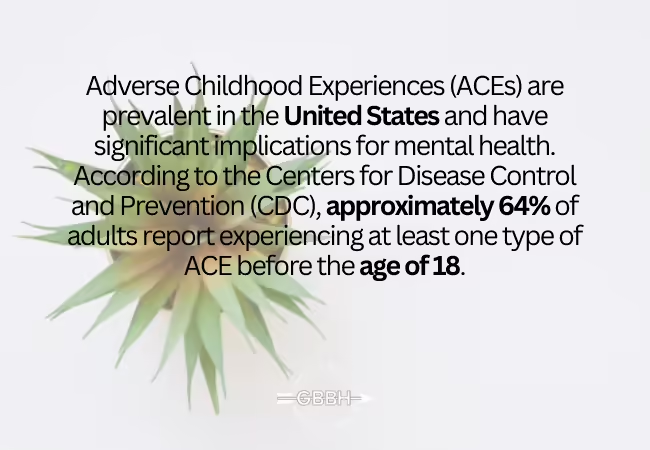Adverse Childhood Experiences (ACEs) are potentially traumatic events that occur during childhood, such as abuse, neglect, or exposure to household dysfunction. These experiences can have lasting effects, shaping emotional health, behaviors, and even physical well-being. At Greater Boston Behavioral Health, we understand the profound impact of ACEs and are committed to helping individuals heal through compassionate, evidence-based care like CBT Therapy, DBT Therapy, and trauma-informed approaches.
What Are Adverse Childhood Experiences (ACEs)?
ACEs encompass a range of events that disrupt a child’s sense of safety and stability, including:
- Abuse:
- Physical abuse: Harmful physical contact intended to cause injury.
- Emotional abuse: Verbal assaults or actions that undermine self-worth.
- Sexual abuse: Unwanted sexual contact or exploitation.
- Neglect:
- Physical neglect: Failing to provide basic needs like food, shelter, or medical care.
- Emotional neglect: Withholding love, support, or attention.
- Household Dysfunction:
- Domestic violence: Witnessing violence between caregivers.
- Parental substance abuse or mental illness.
- Separation, divorce, or incarceration of a household member.
The ACEs framework, developed from the CDC-Kaiser Permanente ACE Study, links these childhood adversities to long-term consequences in physical and mental health. Individuals with higher ACE scores are more likely to face significant challenges throughout life.
The Impact of ACEs on Brain Development
Adverse Childhood Experiences (ACEs) can significantly impact brain development, particularly during critical periods of growth. When children face chronic stress from abuse, neglect, or household dysfunction, their developing brains adapt in ways that may compromise their long-term emotional and cognitive well-being.
1. Changes in Brain Structure
- Amygdala Overactivation: The amygdala, responsible for processing emotions like fear and anxiety, becomes hyperactive due to chronic stress, leading to heightened emotional responses.
- Prefrontal Cortex Impairment: This area of the brain, which governs decision-making, impulse control, and rational thinking, can be underdeveloped, resulting in poor emotional regulation and difficulty handling stress.
- Hippocampus Shrinkage: Responsible for memory and learning, the hippocampus often shows reduced volume in individuals exposed to chronic trauma, leading to challenges in focus and recall.
2. Altered Stress Response Systems
Prolonged exposure to stress activates the hypothalamic-pituitary-adrenal (HPA) axis, flooding the body with cortisol. This constant “fight-or-flight” state can:
- Disrupt emotional balance.
- Impair immune function and physical resilience.
- Create hypersensitivity to perceived threats.
The Lasting Impact of ACEs on Mental Health
ACEs affect mental health through both emotional and physiological pathways. Early exposure to trauma can alter brain development, disrupt stress response systems, and hinder emotional regulation. These effects often manifest in the following ways:
1. Emotional and Psychological Effects
- Increased Risk of Mental Illness: Individuals with ACEs are more likely to experience anxiety, depression, and PTSD.
- Emotional Dysregulation: Difficulty managing emotions, leading to mood swings, irritability, or numbness.
- Low Self-Worth: Persistent feelings of shame or guilt stemming from childhood experiences.
2. Behavioral and Social Challenges
- Maladaptive Coping Mechanisms: Turning to substance use, overeating, or self-harm to manage emotional pain.
- Relationship Struggles: Challenges in forming trusting and healthy relationships due to disrupted attachment styles.
- Risk-Taking Behaviors: Engaging in dangerous activities as a way to cope or seek validation.
3. Physical Health Consequences
- Chronic Illnesses: Increased risk of heart disease, diabetes, and autoimmune disorders due to prolonged stress.
- Shortened Lifespan: High ACE scores correlate with reduced life expectancy, highlighting the importance of early intervention.
How ACEs Shape the Brain and Stress Response
Exposure to ACEs during critical developmental periods can reshape the brain’s architecture. Chronic stress activates the body’s fight-or-flight system, leading to:
- Hyperarousal: Constant vigilance and inability to relax.
- Impaired Memory and Learning: Difficulty concentrating or retaining information.
- Overactive Stress Hormones: Prolonged exposure to cortisol, which impacts overall health.
These physiological changes can perpetuate the cycle of trauma, making it difficult for individuals to break free from its effects without professional support.
Emotional and Behavioral Consequences of ACEs
The emotional and behavioral effects of ACEs are profound and often persist into adulthood, influencing how individuals perceive themselves and interact with the world.
1. Emotional Consequences
- Anxiety and Depression: ACEs increase vulnerability to chronic anxiety, feelings of sadness, and hopelessness.
- Emotional Dysregulation: Difficulty managing intense emotions, leading to mood swings or emotional numbness.
- Low Self-Esteem: Feelings of shame and worthlessness often stem from experiences of neglect or abuse.
2. Behavioral Consequences
- Maladaptive Coping Mechanisms: ACEs often lead to unhealthy behaviors such as substance use, overeating, or self-harm as a way to numb emotional pain.
- Interpersonal Challenges: Difficulty trusting others or forming secure attachments can result from disrupted early relationships.
- Aggression or Withdrawal: Survivors of ACEs may exhibit reactive aggression or isolate themselves to protect against further harm.
Addressing these emotional and behavioral consequences through therapies like CBT Therapy and DBT Therapy is essential for fostering emotional resilience and healthy coping strategies.
Physical Health Risks Linked to ACEs
ACEs don’t just affect mental health—they also have a significant impact on physical health, contributing to chronic illnesses and reducing life expectancy.
1. Chronic Stress and Health
Prolonged activation of the stress response due to ACEs can lead to:
- Cardiovascular Issues: Increased risk of hypertension, heart disease, and stroke.
- Immune Dysregulation: Compromised immune function makes individuals more susceptible to infections and autoimmune disorders.
- Endocrine Disorders: Chronic cortisol release can disrupt metabolic processes, increasing the risk of diabetes and obesity.
2. Behavioral Risk Factors
Unaddressed ACEs often lead to behaviors that exacerbate physical health risks, such as:
- Substance use (smoking, alcohol, drugs).
- Poor diet and lack of physical activity.
- Delayed or avoided medical care due to fear or distrust.
Practical Steps for Individuals Healing from ACEs
Healing from ACEs is a journey that requires effort, support, and self-compassion. While professional therapy is a cornerstone of recovery, individuals can also take proactive steps to promote their emotional and physical well-being.
1. Build a Support System
- Connect with trusted friends, family members, or support groups who can provide emotional validation and encouragement.
- Seek relationships that prioritize trust, communication, and mutual respect.
2. Practice Self-Care
- Mindfulness and Relaxation Techniques: Engage in meditation, yoga, or deep-breathing exercises to calm the mind and reduce stress.
- Physical Activity: Regular exercise helps regulate mood and improve overall health.
- Balanced Diet and Sleep: Nourishing your body with healthy food and rest supports physical recovery and mental clarity.
3. Educate Yourself
- Learn about the impact of ACEs and their connection to emotional and physical health. Understanding your experiences can reduce feelings of guilt or shame.
4. Seek Professional Support
- CBT Therapy: Focuses on identifying and reshaping negative thought patterns that stem from ACEs.
- DBT Therapy: Teaches emotional regulation, mindfulness, and interpersonal skills to navigate challenges effectively.
- Trauma-Informed Care: Work with therapists who understand the nuances of trauma and can provide a safe, supportive environment.
5. Set Realistic Goals
- Break down personal and professional aspirations into manageable steps.
- Celebrate progress, no matter how small, to build confidence and motivation.
Healing from ACEs: Behavioral Health in Boston
At Greater Boston Behavioral Health, we provide comprehensive care tailored to address the unique challenges faced by individuals with a history of ACEs. Our Mental Health Therapy Programs focus on creating a safe and supportive environment for healing.
1. Cognitive Behavioral Therapy (CBT)
CBT helps clients identify and reframe negative thought patterns stemming from childhood trauma. By addressing distorted beliefs, such as feelings of unworthiness or helplessness, clients can regain control over their emotional well-being.
2. Dialectical Behavior Therapy (DBT)
DBT is particularly effective for those struggling with emotional dysregulation. It provides skills for managing intense emotions, improving interpersonal relationships, and increasing mindfulness to reduce reactive behaviors.
3. Trauma-Informed Care
Our trauma-informed approach ensures that therapy sessions are conducted in a way that feels safe and empowering, minimizing the risk of re-traumatization. Key principles include:
- Establishing trust and transparency.
- Empowering clients through collaborative decision-making.
- Fostering resilience and self-empowerment.
The Importance of Addressing ACEs
Ignoring the impact of ACEs can perpetuate cycles of trauma and dysfunction, affecting not only individuals but future generations. Recognizing and addressing ACEs is essential for:
- Breaking Generational Cycles: Educating parents and caregivers about ACEs can prevent the transmission of trauma to their children.
- Reducing Health Risks: Early intervention can mitigate the long-term effects of ACEs on physical and mental health.
- Building Resilience: Strengthening coping mechanisms and emotional skills helps individuals thrive despite their past.
Practical Steps for Healing from ACEs
While professional therapy is crucial, individuals can also take proactive steps toward healing:
- Build Supportive Relationships: Surround yourself with trusted individuals who provide understanding and encouragement.
- Practice Mindfulness: Techniques like meditation or deep breathing can help calm the nervous system and reduce stress.
- Educate Yourself: Learn about ACEs and their effects to better understand your experiences and triggers.
- Engage in Self-Care: Prioritize activities that promote well-being, such as regular exercise, healthy eating, and adequate sleep.
- Consider Therapy: Seek structured support from a professional therapist trained in trauma-informed care.
The Role of Greater Boston Behavioral Health
As a trusted provider of behavioral health in Boston, we offer specialized programs to help individuals process and heal from the impact of ACEs. Our Mental Health Treatment Center in Boston provides:
- Personalized care plans tailored to each client’s needs.
- Access to evidence-based therapies, including CBT and DBT.
- A compassionate, trauma-informed environment that fosters growth and resilience.
Conclusion
Adverse Childhood Experiences (ACEs) can cast a long shadow, but with the right support, healing is possible. At Greater Boston Behavioral Health, we are dedicated to helping individuals overcome the challenges of their past and build fulfilling, emotionally healthy lives. Call us at (888)278-0716 today to learn more about our services and how we can help you on your journey to recovery!
FAQ on Effects of Adverse Childhood Experiences
What are Adverse Childhood Experiences (ACEs)?
ACEs refer to potentially traumatic events experienced during childhood, including abuse, neglect, and household dysfunction, which can impact long-term mental and physical health.
How do ACEs affect brain development?
Chronic stress from ACEs alters brain structure and function, including overactivation of the amygdala, reduced prefrontal cortex development, and shrinkage of the hippocampus, affecting emotional regulation, memory, and decision-making.
What mental health conditions are linked to ACEs?
ACEs increase the risk of anxiety, depression, PTSD, and emotional dysregulation, often leading to challenges in relationships and coping mechanisms.
Can ACEs affect physical health?
Yes, ACEs are linked to chronic conditions like heart disease, diabetes, and autoimmune disorders due to prolonged stress and maladaptive coping behaviors like substance use.
What therapies are effective for healing from ACEs?
- CBT Therapy: Focuses on reframing negative thoughts and behaviors.
- DBT Therapy: Helps manage intense emotions and improve interpersonal relationships.
- Trauma-Informed Care: Ensures a safe, supportive environment for recovery.
How can I start healing from ACEs?
Healing involves seeking therapy, building supportive relationships, practicing mindfulness, and engaging in self-care. Professional support is crucial for addressing deep-seated trauma.
What is trauma-informed care?
Trauma-informed care is an approach that prioritizes safety, trust, and empowerment in therapy to help individuals recover without re-traumatization.


